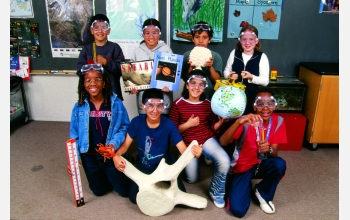|

Press Release 05-125
New Report Stresses Importance of Science and Engineering Opportunities for All Citizens

Despite progress, long-term initiatives are still needed
July 21, 2005
National Science Foundation (NSF) programs and policies have helped increase the participation of women, minorities and people with disabilities in science, technology, engineering and mathematics (STEM), according to a new report prepared by the Committee on Equal Opportunities in Science and Engineering (CEOSE). Yet despite measurable gains, the report—Broadening Participation in America's Science and Engineering Workforce—notes that progress has been slow and uneven across underrepresented groups and the various science and engineering fields.
CEOSE—a congressionally mandated committee established in 1980—advises NSF on policies and programs for increasing the number of underrepresented individuals in the STEM fields.
"The report documents the leadership role NSF has played for the past quarter of a century in broadening pathways for participation in the nation's STEM enterprise," said CEOSE chairman, Robert Lichter. "It also illustrates that bold, innovative, long-term initiatives are still needed, especially at the institutional level."
CEOSE considers broadening participation an urgent need because of the nation's changing demographics, decreasing numbers of foreign nationals entering the STEM workforce and growing international competition for scientific and engineering talent. National ideals of equity and justice demand that all Americans have equal opportunities in science and engineering. But developing an adequate supply of technologically trained workers is also critical if the United States wants to maintain its technological leadership and global competitiveness.
"If the U.S. wants to safeguard its technological leadership, it must develop the science, math and engineering talents of all its citizens," says CEOSE report chairwoman Beverly Hartline. "It is the surest strategy for bringing the best ideas, highest creativity and greatest innovation of our citizens to advance the frontiers of knowledge and tackle today's unprecedented challenges and tomorrow's unanticipated ones."
The CEOSE report, which "lauds the Foundation for its vision, outstanding work, and dedication to its mission," fulfills the requirements of the NSF Reauthorization Act of 2002 (H.R. 4664) by summarizing CEOSE's findings since its inception (1980), providing a 10-year retrospective on NSF's broadening participation efforts and analyzing recent trends in STEM participation.
"Broadening participation is one of NSF's top priorities," says NSF Director Arden L. Bement, Jr. "We will continue to rely on the expert judgment of CEOSE to inform our efforts for encouraging, catalyzing and accelerating progress in this critical area."
Key Findings and Recommendations:
Since the Science and Engineering Equal Opportunities Act of 1980, NSF strengthened its broadening-participation programs and policies and increased its financial investments in efforts targeted at underrepresented groups by 87.5 percent—a rate slightly higher than the overall budget growth during that time period. Analysis of the impact and investment yield of these programs shows that many of them helped increase the participation of women and underrepresented minorities in science and engineering within and outside the Foundation. For example, compared to the 1980's, underrepresented individuals now submit a greater percentage of grant proposals to NSF, serve in greater numbers as NSF reviewers and occupy more professional staff positions at NSF.
Despite measurable progress, CEOSE cites uneven gains across underrepresented groups, and within the various science and engineering fields.
The report calls for NSF to:
- Increase social-science research on the factors that influence progress and provide barriers for underrepresented individuals in STEM at all levels—from learners to leaders.
- Conduct systematic and objective evaluation of its broadening participation policies.
- Continue to use policy "levers" to focus attention of researchers and institutions on the need to broaden STEM participation.
- Engage more Native Americans in STEM fields by enhancing research capacity and opportunities at Tribal Colleges.
The report is available online at http://www.nsf.gov/od/oia/activities/ceose/. For print copies, contact Margaret E.M. Tolbert at mtolbert@nsf.gov.
For additional information and questions, please contact the following CEOSE Committee members:
Indira Nair, Carnegie Mellon University, in0a@andrew.cmu.edu;
Robert L. Lichter, Merrimack Consultants, LLC., RLichter@MerrimackLLC.com;
Beverly Hartline, Heritage University, Beverly.hartline@earthlink.net;
Samuel Myers, Jr., University of Minnesota, myers006@tc.umn.edu
-NSF-

Media Contacts
Nicole Mahoney, NSF (703) 292-5321 nmahoney@nsf.gov
Program Contacts
Margaret E.M. Tolbert, NSF (703) 292-8040 mtolbert@nsf.gov

The National Science Foundation (NSF) is an independent federal agency that supports fundamental research and education across all fields of science and engineering. In fiscal year (FY) 2009, its budget is $9.5 billion, which includes $3.0 billion provided through the American Recovery and Reinvestment Act. NSF funds reach all 50 states through grants to over 1,900 universities and institutions. Each year, NSF receives about 44,400 competitive requests for funding, and makes over 11,500 new funding awards. NSF also awards over $400 million in professional and service contracts yearly.
 Get News Updates by Email Get News Updates by Email
Useful NSF Web Sites:
NSF Home Page: http://www.nsf.gov
NSF News: http://www.nsf.gov/news/
For the News Media: http://www.nsf.gov/news/newsroom.jsp
Science and Engineering Statistics: http://www.nsf.gov/statistics/
Awards Searches: http://www.nsf.gov/awardsearch/
| 

